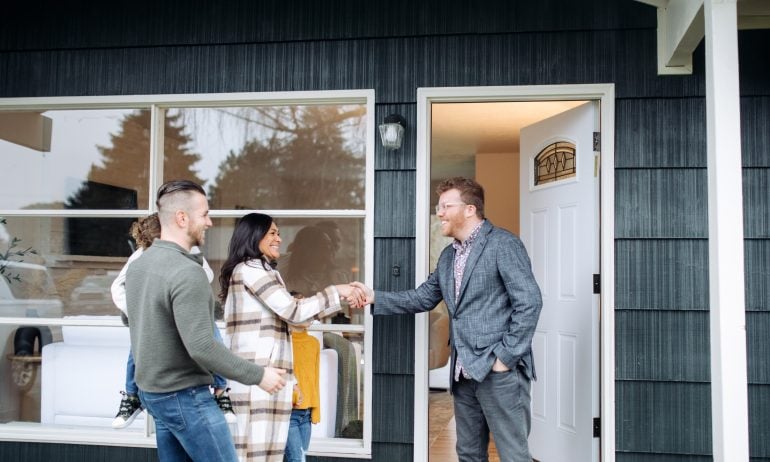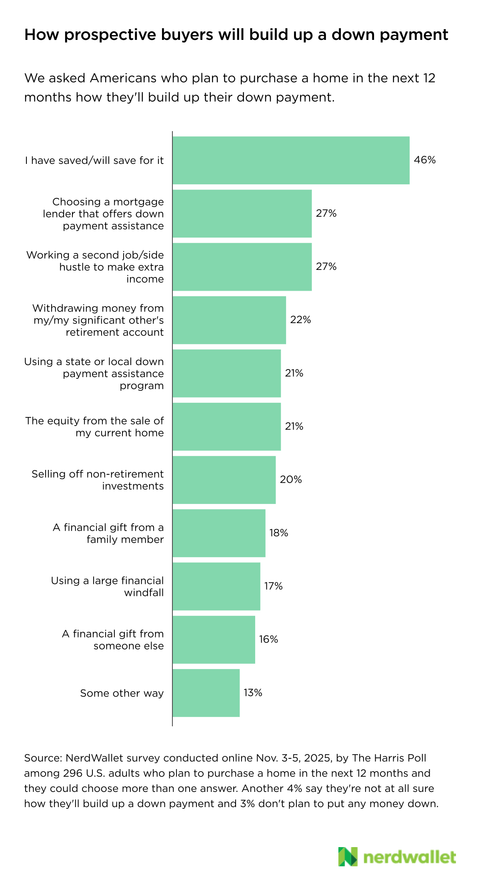Homebuying and Mortgage Statistics
Explore data and studies about home buyers, mortgage rates, homeownership and more from the experts at NerdWallet.

Some or all of the mortgage lenders featured on our site are advertising partners of NerdWallet, but this does not influence our evaluations, lender star ratings or the order in which lenders are listed on the page. Our opinions are our own. Here is a list of our partners.
Data experts on the mortgage team at NerdWallet dig into NerdWallet's survey research, as well as public datasets, to identify trends and provide insights on the ever-changing U.S. housing market. On this page, you'll find some of NerdWallet's most-read research and commentaries on home buyers and sellers, mortgage interest rates and homeownership.
For NerdWallet statistics and data on additional topics, including credit cards, banking and student loans, head to our studies and data analysis hub.
Have questions or want to speak with a NerdWallet expert? Reach out to [email protected].
Mortgage interest rates
Daily mortgage interest rates
More information on today's mortgage interest rates.
Mortgage interest rates this week
NerdWallet's mortgage interest rate forecast is updated weekly with commentary on mortgage rates and housing market trends.
Mortgage interest rates this month
NerdWallet's mortgage experts write a monthly column covering the near-term forecast for mortgage rates.
Annual home buyer report

Every winter, NerdWallet collaborates with The Harris Poll to survey U.S. adults 18 years and older. The results provide a nationally representative snapshot of how Americans perceive the housing market.
2026 Home Buyer Report: Challenges persist for home buyers, while AI emerges as a new tool in the homebuying journey.
2025 Home Buyer Report: There's plenty of pent-up demand from home buyers, but inventory, interest rates and inflation present significant challenges.
2024 Home Buyer Report: Pessimism reigns as home buyers struggle and the goal of homeownership loses some of its luster.
2023 Home Buyer Report: Higher mortgage interest rates and apprehensions about the economy have Americans unsure about their ability to purchase homes.
2022 Home Buyer Report: Lingering effects of the pandemic stymie both prospective home buyers and sellers.
2021 Home Buyer Report: Pent-up demand from would-be home buyers clashes with a limited supply of homes for sale.
2020 Home Buyer Report: Buying a home is a top priority, especially for younger generations, but some feel locked out of homeownership.
2019 Home Buyer Report: Recent buyers have had to get competitive to close their deals, and many feel stretched by the costs of homeownership.
2018 Home Buyer Report: Homeownership is a widely shared goal, but concerns about costs keep some buyers sidelined.
Quarterly first-time home buyer affordability report
Each quarter, NerdWallet economist Elizabeth Renter analyzes information from sources including the U.S. Census, the Bureau of Labor Statistics and the National Association of Realtors to better understand the challenges facing first-time home buyers.
Q3 2025: A slightly better outlook for first-time buyers, with home prices falling nationwide.
Q2 2025: Inventory improves, but high home prices and mortgage rates remain headwinds.
Q1 2025: Higher interest rates dampen the effects of lower home prices for would-be buyers.
Q4 2024: Increased inventory and modestly lower prices don't translate to more home sales.
Q3 2024: Markets cool in some parts of the country, but many first-timers remain priced out.
Q2 2024: Inventory deficits keep prices high; high prices discourage would-be buyers.
Q1 2024: Home prices remain high through the holidays, usually the least-expensive time of year.
Q4 2023: A slight bump in inventory isn't enough to ease affordability challenges.
Q3 2023: Higher mortgage rates outpace slight price declines seen in some metros.
Q2 2023: Seasonality appears to be returning to home prices.
Q1 2023: Banks' tighter lending standards add to the difficult climate for first-time buyers.
Q4 2022: Higher mortgage interest rates deter buyers, easing inventory woes.
Q3 2022: Price increases slow, but rising mortgage rates eat into potential savings.
Q2 2022: Falling wages and price growth intensify affordability struggles.
Q1 2022: Two years' worth of data highlights housing market challenges.
Q4 2021: High prices and low inventory are a double whammy in some markets.
Q3 2021: Moderate improvements may be blips, not trends.
Q2 2021: Notable year-over-year decline in affordability.
Q4 2020: Typical winter shifts in the housing market may help home buyers.
Q3 2020: Competition is hot for the limited supply of homes on the market.
Q2 2020: Real estate booms as the country comes out of quarantine.
Q1 2020: Home prices rise, even as the effects of the pandemic are unclear.
Recent housing market commentary

Mortgage rates started February pretty much exactly where they left January, with minimal activity this week. Potentially market-moving government data reports were temporarily scuttled by the brief government shutdown. Private-sector employment data released this week showed a depressed labor market; if the rescheduled jobs report reflects similar findings, we could see mortgage rates go down a bit.
February 5, 2026
Kate Wood is available for media interviews, discussing mortgages, homebuying and homeownership. Contact [email protected].
Recent home and mortgage coverage from Kate Wood
Additional studies and data analysis
Home buyers
2025 study: 1 in 5 home buyers regret buying their current home (Aug. 2025).
2024 data analysis: 20% down payment myth may hold back buyers (Feb. 2024).
2023 data analysis: Expected budgets fall short of average home prices (Jan. 2023).
2022 data analysis: Calibrating expectations in a difficult housing market (Jan. 2022).
2021 study: Avoiding regret in a hot housing market (Sept. 2021).
2021 data analysis: Ingredients for buyer success in a hot market (Jan. 2021).
2019 data analysis: Comparing mortgage lenders could save buyers $30,000 (June 2019).
Home improvement
2024 study: Rate lock-in effect contributes to homeowners' multi-billion-dollar renovation spending (Nov. 2024).
2022 study: After a boom in renovations and DIY projects, homeowners may dial back home improvement plans (Nov. 2022).
2020 study: Homeowners prioritize DIY and paying for projects with cash (Oct. 2020).
Home safety
2025 study: Home security systems are now commonplace, but basic home maintenance is less of a priority. (July 2025)
Home sellers
2023 data analysis: Why homeowners may want to sell despite higher interest rates (March 2023).
2022 data analysis: Benefits of selling in a hot housing market (Feb. 2022).
2021 study: What to expect listing a home in a seller's market (April 2021).
2019 study: What sellers should know before listing (May 2019).
Housing market
2024 data analysis: Fluctuations in seasonal trends (April 2024).
2023 data analysis: Why some Americans choose to rent (Jan. 2024).
2023 data analysis: The return of seasonal housing market trends (July 2023).
2019 study: Affordability is the largest hurdle to Americans' relocation plans (Sept. 2019).
Mortgage denials
2024 data analysis: High debt-to-income ratios and appraisal gaps were the main reasons lenders denied mortgage applications (Nov. 2025).
2022 data analysis: Higher home prices and debt contribute to home loan denials (Nov. 2023).
2021 data analysis: Competition and lack of collateral drive mortgage denials (Oct. 2022).
2020 data analysis: Tighter lending standards make some home loans harder to obtain (Nov. 2021).
2019 data analysis: Debt-to-income ratio most-cited reason for mortgage denials (Oct. 2020).



